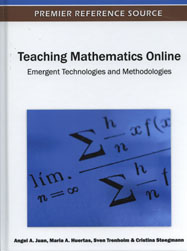|
|

Description
Educational technologies (e-learning environments or learning management systems for individual and collaborative learning, Internet resources for teaching and learning, academic materials in electronic format, specific subject-related software, groupware and social network software, etc.) are changing the way in which higher education is delivered. Teaching Mathematics Online: Emergent Technologies and Methodologies shares theoretical and applied pedagogical models and systems used in math e-learning including the use of computer supported collaborative learning, which is common to most e-learning practices. The book also forecasts emerging technologies and tendencies regarding mathematical software, learning management systems, and mathematics education online and presents up-to-date research work on how mathematics education is changing in a global and Web-based world, such as Mathematica and Wolfram Alpha. Contents A Model for Asynchronous Discussions in a Mathematics Content Course | A Blend Learning Approach in Mathematics | Screencasting for Mathematics Online Learning: A Case Study of a First Year Operations Research Course at a Duel Delivery Mode Australian University | Mathematics Education: Teaching and Learning Opportunities in Blend Learning | Best Practices for Hybrid Mathematics Courses | Implementation of learning Outcomes in Mathematics for Non-Mathematics Majors by Using E-Learning | Online Communities of Practice as Vehicles for Teacher Professional Development | Mathematics Bridging Education Using an Online, Adaptive E-Tutorial: Preparing International Students for Higher Education | Teaching Mathematics Teachers Online: Strategies for Navigating the Intersection of Andragogy, Technology, and Reform-Based Mathematics Education | Developing Teachers’ Mathematical Knowledge for Teaching through Online Collaboration | Self-Regulated Learning and Self Assessment in Online Mathematics Bridging Courses | Long-Term Experiences in Mathematics E-Learning in Europe and the USA | My Equations Are the Same as Yours!: Computer Aided Assessment Using a Gröbner Basis Approach | Interactive Web-Based Tools for Learning Mathematics: Best Practices | NAUK.si: Using Learning Blocks to Prepare E-Content for Teaching Mathematics | Software Tools Used in Math Refresher Courses at the University of Alcalá, Spain | Formula Editors and Handwriting in Mathematical E-Learning | The Role of Technology in Mathematics Support: A Pilot Study Related Topics |
|
|
